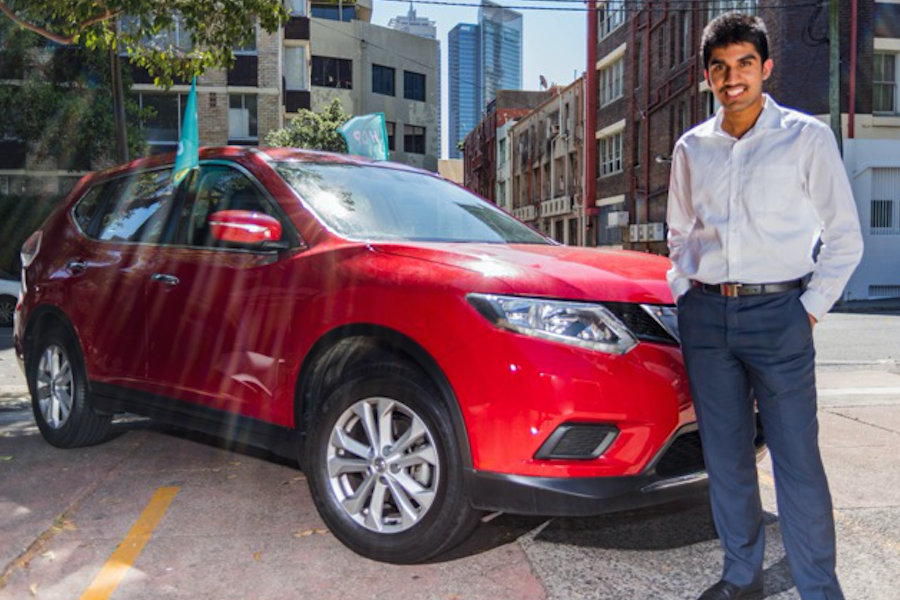While the cynical among us might wonder what would possess someone to launch a new ridesharing service when the market is already dominated by a certain player and it’s evident smaller competitors are struggling to put up a decent fight, other eager entrepreneurs believe there are gaps in the market to be exploited.
One such entrepreneur is Sydney’s Zeryab Cheema, founder of new rideshare service Hop.
The main difference between Hop and the other players is in the cars drivers use, with Hop connecting drivers to Hertz rental cars. Through this partnership, drivers pay to rent a car from Hertz and then keep 100 percent of all fares.
“To be able to use existing resources – rental cars – and transform them for income generation and better utilisation, seemed pretty cool. After a few discussions with Hertz, we collaborated to bring Hop to life and give people a choice by transforming what was already available into something different,” Cheema said.
While only 20 years old, Cheema has significant experience in the transportation space, having founded on-demand taxi booking app Taxi 24/7 when he was just 15.
“Taxi 24/7 taught me to move fast and not get busy with the details, rather build a project and pivot but keep the aim the same. By continuously changing the aim of a project, an entrepreneur can lose focus on what they set out to do,” he said.
The core aim of Hop has always been providing drivers with rental cars to help them make money. With seed funding from private investors in hand, the startup first approached Hertz late last year, with much time spent on enabling cars to be booked directly through the Hop app and allowing drivers to begin taking rides as soon as they had picked up the car.
“As the project progressed, we realised the demand for the solution was far greater than anticipated. Thousands of drivers had to lease or purchase cars for ride sharing purposes when they could access the thousands of rental cars available. Passengers also wanted to pay for a better and more open service,” Cheema said.
“When we provide Hertz cars to drivers, we reduce the cost and increase the benefit. At the same time, we can keep our pricing low to make the service affordable and efficient.”
Drivers begin by registering through the Hop app. They are then sent an email asking for more details and specific documents, and then invited to attend a driver information session, after which they will be approved and able to rent a car.
Three types or tiers of cars are offered for rent – Plus, Pro, and Lux – with insurance and standard maintenance included; these tiers are linked to the Hop service passengers can book. Rental fees vary depending on the model and rental period, with drivers able to book some cars by the hour or for up to 90 days, with fees starting at $6 per hour. As it doesn’t take a cut of fares, Hop takes a cut of the rental fees.
Passengers then download the app, fill in their payment details, and then start booking a trip. Based on their car selection a fare estimate is provided and they can book a ride, with a $2 booking fee charged.
They can also book a ride from the street by approaching a ‘street usher’, Hop staff working on busy street spots to help book rides for people without the app.
Drivers will then receive the ride request and are guided to collect the passenger. Each driver is also equipped with a Square reader, so cashless payments can still be taken if the ride has been requested through a street usher rather than the passenger’s app.
Hop launched a trial in the eastern suburbs of Sydney in mid-November, which saw around 600 trips taken to transport 2000 passengers. It has signed up over 350 drivers.
According to Cheema, drivers signed up include office workers, existing ridesharing drivers, taxi drivers, and hire car drivers, and people without cars and those with older cars that would not accepted by Uber.
The core of the Hop model – the rental car – has been explored by other services. Launched earlier this year was Splend, an car rental startup that provides customers with brand new vehicles specifically for the purposes of on-demand driving services such as Uber.
The Splend service works through a subscription model, with customers paying a one-time joining fee, which covers administrative costs and a police check, and then a weekly fee of to cover the cost of the car and servicing with a minimum rental period of six weeks. Over the year, Splend has introduced a rent-to-buy service.
As well as the extremely cashed up Uber, Hop also has the likes of GoCatch to contend with, while taxi booking and payments app Ingogo is also growing.
Needless to say, the challenge ahead of Hop is significant, but Cheema is determined. The startup will focus on establishing a presence in Sydney before looking to Melbourne and Brisbane.
Image: Zeryab Cheema. Source: Supplied.




















Trending
Daily startup news and insights, delivered to your inbox.